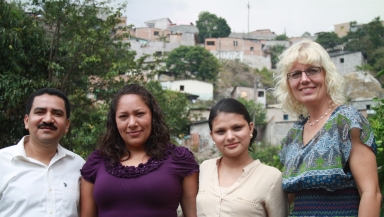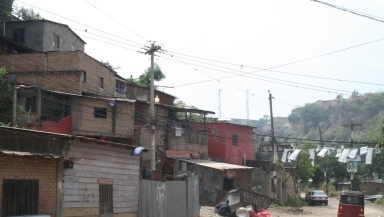
Swedish missionary Miriam Mondragon is working to see transformation in one of the world's most dangerous countries: Honduras, Central America.
Supported by Tearfund, Miriam is passionate about seeing the Church mobilised to bring peace and reconciliation in a country fractured by civil war, violence and extreme political unrest. In addition to working directly with victims of horrific violence and sexual abuse, her organisation - Alianza Cristiana por el Diálogo y la Conciliación – thus partners with local churches to advocate for justice.
Currently in the UK for a short time, Miriam shared with Christian Today about her vision to see Honduras united.
CT: How did you first start working in Honduras?
MM: I came to Honduras for the first time 21 years ago; I was volunteering with a Swedish organisation working with literacy and education in slum areas – I got sent to a neighbourhood called 'Little Hell'! It was a wonderful period, and I started working also in the justice sector.
The Alliance started after the coup in 2009, and by then I was really committed to Honduras, and I also married a Honduran man!
CT: Can you tell us a bit about the projects you work with?
MM: In Honduras I work in three main areas: in reconciliation, supporting pastors and leaders working in difficult and violent areas; coordinating a rescue programme for children who are suffering from sexual abuse; and coordinating a programme in slum areas where we help kids at extreme risk, and their families.
We want to reach the top ten per cent of the most vulnerable of the population in Honduras. We work in the worst areas, in the worst sectors, in places where everyone is part of a gang. We go to the most complicated areas, and then go to the poorest houses and make sure we're reaching those that no one else wants to work with.
We have a special programme called Impact Club, which teaches young people about active citizenship, how to get and keep employment, social entrepreneurship and leadership, and we're hoping that it will be replicated on a national level.
I'm also working at a national level coordinating a rescue team which is made up of a lawyer, an investigator, two psychologists and myself, and we take really difficult cases where there has been no justice, and help families with the legal process and restoration. For example, we just worked together to locate a serial rapist who had attacked about 40 girls and brought him to justice. It's been a long and difficult process, but it's so important to empower young people so they can dream again, see that they can have a future and can be brave.

CT: How is the Alliance working with the local church?
MM: The Alliance is working to strengthen pastors and leaders who work in difficult and hard contexts. The Church in Honduras represents about 40 per cent of the population, and it's a giant that's beginning to awaken. Violence and crime has come to the doors of the Church – it's getting extorted by gangs, members of churches are being victims of crime and people are being assassinated. It's important that we as an Alliance can support them in this situation.
Honduras has the highest murder rate in the world, and when people think of the most dangerous places they think of Afghanistan and Iraq, but really it's Central America.
The only hope for Honduras is a Church that stands up, demands justice and makes proposals as to how we can move forward. Almost the whole population of the city are believers, but it's not enough just to be Christians – we have to be brave Christians.
We have to be a prophetic voice, and that's the part where the Alliance wants to give hope; so we're sharing models with churches that they can use with youth at risk, and we're showing them how they can work to end crime, how they can denounce acts of corruption and work towards a more just society. We want to be a tool for the Church.
CT: Why is there such a need to unite the Church in Honduras?
MM: The Alliance was formed after the coup in 2009 because there was such a conflicted situation; the Church split and so did society as whole, and even families. We just wanted to let people meet and engage with one another. We wanted Christians to realise that our faith is much bigger than ideological things, so we got the Christian military and Christians from the left wing to meet – which was very difficult!
In the past most of the Church has only focused on the spiritual part of the Gospel, but I think it's so important that Christians understand that the Gospel is about holistic mission. What we want to do is support those that want to change; in all transformation there are a few people who take the first steps, and then the majority comes. We want to support the few that have the courage to do things and we are now seeing them make change.
We now have 3,000 churches bravely speaking up against injustice, and they've been inspired by other Christians who have taken the first step. Now churches are working in incidence and advocacy; there's a long way to go but a lot has happened in the past two years. We're not a big organisation, we're just volunteers who want to support and help in this difficult situation.
CT: What impact could it have on Honduras, and the lives of those in poverty, if the whole Church was united?
MM: The whole difference would be made; there are so many believers in Honduras – 40 or 50 per cent are Evangelical and then there's a big movement of revival in the Catholic Church – so if we were all united in being brave, then there would be a huge difference.
The Church is the only hope for Honduras; so many things are against us – crime, drug cartels, impunity, corruption – but if there are Christians on all levels in society, and these Christians become brave Christians, then the whole of society will change. We need inspiring people, and we need the Holy Spirit, because we need to transmit the sense of courage to stand up, and not only be listeners, but doers.
CT: And finally, how can people be praying for you?
MM: Please pray for protection, and also that the Church as a whole will wake up in Honduras.
Miriam is one of Tearfund's Inspired Individuals. Find out more here.













